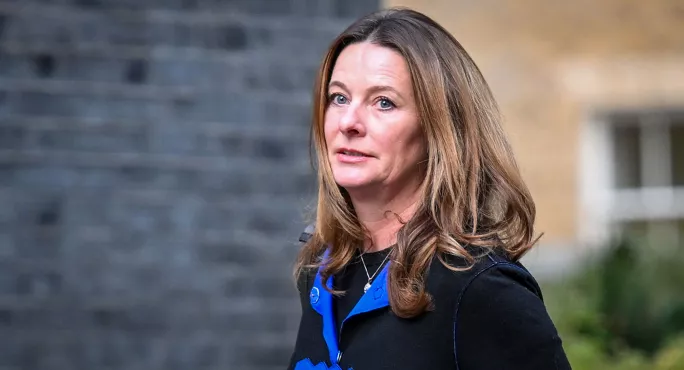The 6 big education issues in Gillian Keegan’s in-tray

It has been quite the period of upheaval at the Department for Education. Following several predecessors whose stints each lasted less than two months, Gillian Keegan has been named education secretary.
The DfE was also hit by a wave of junior ministerial resignations in the summer, starting with the departures of schools minister Robin Walker and children’s minister Will Quince, and has faced two full reshuffles since then.
The new secretary of state will be expected to help the government to deliver on the 2019 Conservative manifesto - on which Boris Johnson was elected - according to a speech by new prime minister Rishi Sunak this morning.
- Teacher pay: Government “won’t budge” on 5 per cent offer
- School funding: MAT leaders warn Truss over financial viability concerns
- Rishi Sunak as PM: What will it mean for schools?
In the speech, Mr Sunak said this included “better schools”.
The schools section of the 2019 manifesto included the heading “invest in our schools”, and committed to delivering a £30,000 teacher starting salary, backing heads to use exclusions, expanding alternative provision schools, continuing to build more free schools and investing in arts, music and sport.
But aside from this, there are several pressing issues that Ms Keegan will face immediately in her new role.
So, what exactly is sitting at the top of her in-tray? Here are six ongoing challenges for her to tackle.
1. Schools Bill struggles
Ms Keegan has taken on the role just as the Schools Bill looks like it may collapse.
The legislation is aimed at helping create a system where all state schools are in, or run by, multi-academy trusts by 2030.
The government initially planned to create new academy standards and create powers of intervention for MATs that are judged to be failing.
However, it first had to withdraw large swathes of its own bill amid concerns among peers and academy trust leaders that the legislation would have given the education secretary too much control over MATs and the day-to-day running of schools.
Now, it is unclear if the bill will continue at all, though at the time of publication, it remains active, creating further uncertainty around many of its key tenets such as multi-academy trust (MAT) regulation.
2. Teacher pay
The cost-of-living crisis and long-term concerns about the erosion of teacher pay, in real terms, could bring this issue to a head later early next year.
The NEU teaching union has said all teachers should have an inflation-plus pay rise, while the NASUWT teaching union is calling for 12 per cent.
But schools minister Jonathan Gullis said earlier this month that the government would not budge on its 5 per cent offer.
Now, the NEU has said industrial action could come as early as January.
It comes after the NAHT school leaders’ union announced that it would move to a formal industrial action ballot over potential strike action, following a consultation with its headteacher and school leader members.
And the NASUWT teaching union said it would ballot its members on industrial action over pay, with papers due to be issued to members from 27 October and the ballot closing on 9 January.
3. Funding issues
Schools have been warning of funding issues for months, with high inflation leading to soaring energy costs, catering bills and more.
Leaders have warned that further cuts - touted by chancellor Jeremy Hunt and others - would be “catastrophic” for education.
More answers on this topic are likely to come from next week’s Budget, but the issue seems here to stay, with the Institute for Fiscal Studies warning that school funding will barely increase in the next few years when adjusted for inflation, if current plans remain.
4. Education recovery
Amid the political chaos in Westminster this summer was a real insight into the Covid pandemic’s impact on children’s learning, provided by the 2022 Sats results.
They showed that the percentage of key stage 2 pupils meeting the expected standard in all three areas of reading, writing and maths was 59 per cent this year - down from 65 per cent in 2019. The government target is to get this up to 90 per cent by the end of the decade.
This is against a backdrop of concern about the delivery and take-up of the DfE’s National Tutoring Programme. Helping ensure pupils’ education recovers from the pandemic is likely to be one of the biggest tasks for Ms Keegan and the government.
5. Initial teacher training
One main concern in the sector at the moment is the further threat to an already depleting teacher supply pipeline after the results for the second round of the ITT market review saw 70 providers fail accreditation.
While these providers can continue until September 2024, many are concerned about trainee uncertainty and a loss of access to local training. Now, the DfE faces the prospect of plugging these cold spots, especially in the North East where a Tes investigation revealed almost a third of trainee places are at risk.
6. Teacher recruitment and retention
The pay and ITT challenges both feed into another major one: ensuring that schools have enough teachers.
Data is consistently showing that the recruitment boost provided by the economic downturn of Covid is over, and the government has been warned by headteachers’ leaders that the country is facing “an actual crisis” in teacher recruitment.
You need a Tes subscription to read this article
Subscribe now to read this article and get other subscriber-only content:
- Unlimited access to all Tes magazine content
- Exclusive subscriber-only stories
- Award-winning email newsletters
Already a subscriber? Log in
You need a subscription to read this article
Subscribe now to read this article and get other subscriber-only content, including:
- Unlimited access to all Tes magazine content
- Exclusive subscriber-only stories
- Award-winning email newsletters
topics in this article



